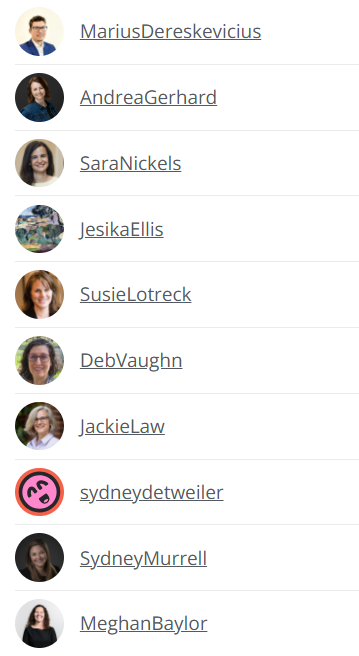Best Of
2025 Year in Review
Happy New Year! Scroll through our 2025 Compass Year in Review to see everything we accomplished together. Thanks for contributing, connecting, and being such an important part of our growing community!
In 2025 we had….
654 New members
368 New discussions
734 New comments
285 Contributors
88 Questions answered
134,325 Visits
Top 20 Members of 2025 (totaling 1,878 points)
- @AndreaGerhard
- @SaraNickels
- @JoleneWillis
- @KatieDecker
- @MariusDereskevicius
- @LyndseyThompson
- @MeganDeHoog
- @AndrewBusch
- @SusieLotreck
- @MeghanBaylor
- @TeriKleckner
- @ConnerPeckham
- @DebbieStanton
- @AustinSchroeder
- @MarkBejcek
- @LenoraLaVictoire
- @RobinForemanWheeler
- @jillfreese
- @SydneyMurrell
- @AmandaHester
Top Searches (2,342 in total)
- Grant
- Portal
- Fund
- Scholarship
- Report
Top Reactions from the Compass Community
- 859 Likes
- 540 Awesomes
- 236 Vote Ups
- 152 Insightfuls
- 111 Agrees
- 12 LOLs
Members Who Earned a Caramel for Comments Badge
- @SusieLotreck
- @AndreaGerhard
- @SydneyMurrell
- @elizabethmesserli
- @KatieDecker
- @AaronSpevacek
- @DanaJeffery
I am looking forward to even more contributions in 2026!
Re: How does your organization break down fund groups, subgroups, divisions, and segments?
I think our set up is fairly similar!
Group - Fund type; we have quite a few so this area is pretty drilled down & specific. EX. DAF - Legacy - Endowed; DAF - Legacy Fixed Advice; DAF - Express - Nonendowed; etc.
Subgroup - We use this as more of an umbrella grouping EX. all Endowed, Nonendowed, Legacy, Field of Interest, Designated, permanent funds, scholarships, DAFs, CGAs, Trusts, etc.
Divisions are more so used for separating entities that require a different income tax process.
Segment is used for separating out how a fund is invested. Ex. equity pool, growth pool, general pool, etc.
October's Top 10 Compass Members!
Happy November! 🍂🍁🦃
Congrats to our Top 10 community members who lit up Compass with their engagement and dedication throughout October! Let's give a round of applause to: @MariusDereskevicius, @AndreaGerhard, @SaraNickels, @JesikaEllis, @SusieLotreck, @DebVaughn, @JackieLaw, @sydneydetweiler, @SydneyMurrell, and @MeghanBaylor!
As always, each of you is entered into our monthly draw for a special surprise. Stay tuned for tomorrow to see who’s chosen! 🎁✨
Want to land on next month’s leaderboard? Take a peek at this post to learn how. And don’t forget: adding a profile photo not only earns you points, it helps build a friendlier Compass community.
–Gretta, Compass Intern
Dallas Data Visualization Training
Just wrapped up an energizing in-person training on the New Data Visualization Tool with an incredible group of clients! 🎉📊
A huge thank you to everyone who joined, asked thoughtful questions, and brought such great energy to the room. It was a pleasure exploring how to turn complex data into clear, impactful visuals with you all.
@BryanGeary, @SammieHolzwarth, @MarieShores and I are looking forward to seeing how you put these tools into action — and to working together again soon!
Checkout a few of our pictures! @RachelJoachimi @andriabaker @ChristinePerez @brookeanguiano @SusieLotreck @juliedowell @MadelineBennett @MikeLuce @CyndiVara @AnthonyReimherr @ConnorPearson @henamasood @AmyStaufenberg @FredGarcia @FeliciaWilliams @LaurelShulman @IsabelWeeden







